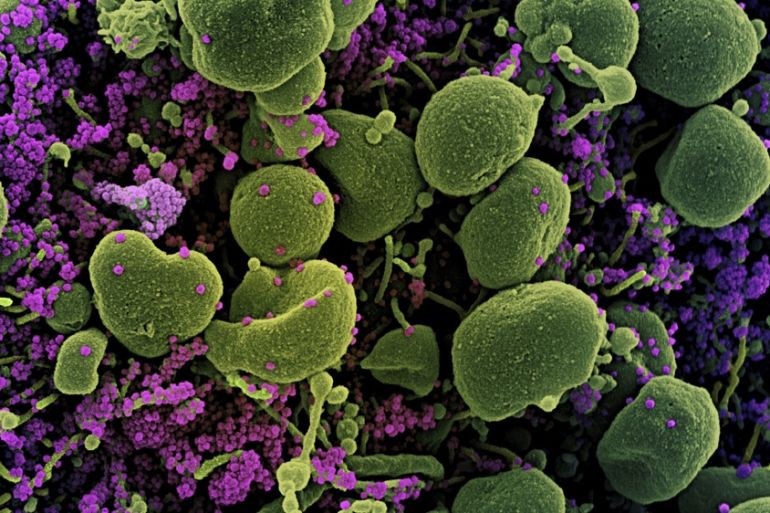What we know about the South African coronavirus variant
The SARS-CoV-2 virus variant that was first detected in South Africa has spread to dozens of countries.

As the coronavirus has spread around the world, it has constantly mutated, leading to the emergence of new strains. The variant of the SARS-Cov-2 virus first discovered in South Africa late last year is among those most concerning health experts.
The South African variant
The South African variant, also known as B.1.351, was first discovered late last year. It has since been detected in dozens of countries around the world.
Keep reading
list of 3 itemsIraq infections surge as coronavirus variant fuels second wave
How dangerous is India’s ‘double mutant’ COVID-19 variant?
It contains two mutations that have raised concerns that it could be more infectious than previous strains of the virus and could be able to evade some of the antibody response caused by vaccines or previous infections.
The first, known as the N501Y mutation, makes it more likely to bind to human cells, which could enhance its transmissibility. It also has the E484K mutation, which is thought to help the virus evade parts of the immune system and antibodies.
According to the World Health Organization, preliminary studies suggested the variant was associated with “a higher viral load, which may suggest potential for increased transmissibility, this, as well as other factors that influence transmissibility, are subject of further investigation”.
“Moreover, at this stage, there is no clear evidence of the new variant being associated with more severe disease or worse outcomes,” the WHO said.
Do vaccines work against the variant?
A real-world study released in Israel on Saturday found that the variant first discovered in South Africa can “break through” Pfizer-BioNTech’s coronavirus vaccine to some extent.
The study compared almost 400 people who had tested positive for COVID-19, 14 days or more after they received one or two doses of the vaccine, against the same number of unvaccinated patients with the disease. It matched age and gender, among other characteristics.
The South African variant was found to make up about one percent of all the COVID-19 cases across all the people studied, according to the study by Tel Aviv University and Israel’s largest healthcare provider, Clalit.
But among patients who had received two doses of the vaccine, the variant’s prevalence rate was eight times higher than those unvaccinated – 5.4 percent versus 0.7 percent.
This suggests the vaccine is less effective against the South African variant, compared with the original coronavirus and a variant first identified in Britain that has come to comprise nearly all COVID-19 cases in Israel, the researchers said.
“We found a disproportionately higher rate of the South African variant among people vaccinated with a second dose, compared to the unvaccinated group. This means that the South African variant is able, to some extent, to break through the vaccine’s protection,” said Tel Aviv University’s Adi Stern.
The researchers cautioned that the study only had a small sample size of people infected with the South African variant because of its rarity in Israel.
They also said the research was not intended to deduce overall vaccine effectiveness against any variant, since it only looked at people who had already tested positive for COVID-19, not at overall infection rates.
Pfizer made no immediate comment on the Israeli study, which has not been peer-reviewed.
Earlier this month, Pfizer and BioNTech said clinical trial data signalled that their COVID-19 vaccine could protect against B.1.351. In a trial with some 800 participants in South Africa, a relatively small number, the companies found that the shot was 100 percent effective in preventing illness.
Some previous studies have indicated that the Pfizer-BioNTech shot was less effective against the B.1.351 variant than against other variants of the coronavirus, but still offered a robust defence.
As for the Moderna vaccine, the company producing it said in late January that its vaccine was effective against the South African strain.
While there was a six-fold reduction in neutralising antibodies produced against the South African variant, the levels remained above those that are expected to be protective, Moderna said.
Meanwhile, the Oxford-AstraZeneca vaccine offers as little as 10 percent protection against the variant, researchers have suggested.
A trial of Johnson & Johnson’s vaccine, which was made in partnership with Janssen Pharmaceuticals, found it was about 85 percent effective in protecting against severe cases of COVID-19, and 57 percent effective against all forms of the disease.